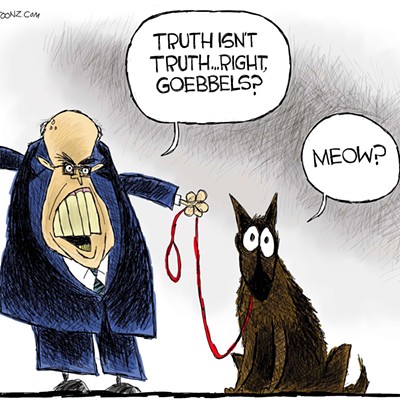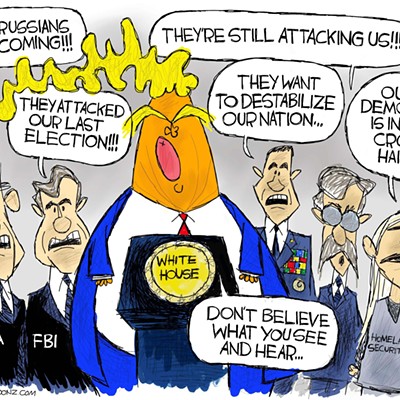A lifetime or two ago, a high school student told me she was "entitled" to her take on American history because everyone had "the right to their own opinions." Because she had no knowledge base on which to form an opinion, she was entrenched in her ignorance and unwilling to hear anything resembling an accurate telling. Like too many adults, she was sure that whatever came out of her mouth was valid, despite her aversion to anything as cumbersome as reading.
Reading history is a tricky and sometimes boring business. If your exposure to the historical record is limited to a high school or college text, you can rest assured you are being fed what is politically and academically correct for the times. Unless you are willing to wade through mounds of documents and primary sources, you'll end up with a sanitized version of the story.
Every nation on Earth has a history comprised of facts colored by myth. Our myth serves to keep the citizenry from looking too closely at how Byzantine webs of government entities, public and private institutions, and wealthy dynasties have succeeded in reducing the democratic ideals of the 18th century to a sham.
But myth serves another, more venal purpose: It provides young men and women a belief system prompting them to put their lives on the line for some vague notion of honor and "service to my country." If you are asked to take a bullet or take a life in order to rid a nation of a dictator your government tells you is an "imminent threat," you are more likely to go along than if you are told you are a pawn in a system of profits resting on the corruption spewing from oil fields in the Middle East.
Even if you know you are mere cannon fodder for Halliburton, if your unit is called, you will more than likely serve. No one is burning draft cards these days, because there are no draft cards, and besides, you're betting on survival so you can live long enough to get to college or collect your pension.
But the soldiers who served in Vietnam were, in significant ways, different from those being blown up in Iraq. By far, the majority of them were young men who had neither college deferments nor powerful daddies to keep them out of harm's way. And there were (as there are in all wars) the young idealists, the ones who believed what their government told them and were willing to risk their lives for what they thought was a noble cause. These young men enlisted to fight for their country and their ideals. To this day, many of them carry the emotional burden of what they saw, what they did and what they learned.
This column is dedicated to all of them, and especially to three who most touched my life: to the brother-in-law who committed suicide because he was haunted by his personal images of horror; to the one who proudly entered the military and returned home bitter and disillusioned; and to the one who cried across a table from me, unable to tell what he'd done but still living with the grief of knowing the government of his beloved country had lied to him and used him, as it used--and continues to use--so many others.
I am not much affected by last week's letter writer, who impugned my journalistic integrity: I know my generation of reporters is the same one that spawned Woodward and Bernstein. Most of us continue to work with their same high level of ethics despite people like Stephen Glass and Jason Blair and the abhorrent phenomenon of celebrity journalists.
But what does warrant rebuttal is the writer's implication that Vietnam was a repetition of World War II, with kindly American troops handing out cigarettes and candy bars. Even if the soldiers provided Godiva chocolates to their prisoners, it does not compensate for a land ravaged by napalm, nor atrocities such as My Lai.
This is not to say many soldiers did not act honorably. Certainly they did. But to act honorably in a dishonorable situation is not as simple as it seems. Is it honorable to follow orders when your gut tells you that what you're doing is flat-out wrong? Is it honorable to frag your commanding officer if his ill-thought-out orders will get you and your buddies killed?
Finally, it should be noted that the letter writer misquoted my column. I identified my source as a member of an "elite force engaged in covert operations," not a "combat veteran from an elite force." This quibbling is necessary because the word "covert" is not unimportant: It explains why he could only speak anonymously.
Perhaps more than any other generation, the soldiers who fought in Vietnam learned first-hand what was said long before that conflict: The first casualty of war is truth.






